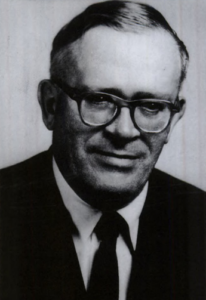In a future set of articles, I intend to discuss Richard Weaver‘s views on the role that ideas play in society. His most famous work, Ideas Have Consequences, deals with this issue. I am still working on those, so to give a brief taste of his focus, I thought it might be helpful to discuss the fundamental root of the issue – and one that has had a major impact on our culture – the very definition of truth.
 Weaver considers two polar opposite views of truth: Transcendence (or Universal/Absolute Truth) and Nominalism (Subjective or Non-Universal Truth). In his view, beginning in the 14th Century, especially under the influence of William of Occam, the long-standing view of Transcendence (Absolute Truth) was replaced in Western Culture by Nominalism. He saw this as a travesty, and I am inclined to agree.
Weaver considers two polar opposite views of truth: Transcendence (or Universal/Absolute Truth) and Nominalism (Subjective or Non-Universal Truth). In his view, beginning in the 14th Century, especially under the influence of William of Occam, the long-standing view of Transcendence (Absolute Truth) was replaced in Western Culture by Nominalism. He saw this as a travesty, and I am inclined to agree.
Regardless of when and how, the fact is that Western Civilization did see a decline in a belief in Universal Truth and the rise of Subjective views on the matter. If you read the links above, you might find your head spinning, if you have not spent much time pondering philosophy and metaphysics, but this is no light matter, nor one to be dismissed. Weaver was on to something that really matters.
Our very understanding of the world around us, and Weaver often used the term “world view,” long before it was fashionable, is predicated upon how we view truth. Here is the crux of the matter: If there is such a thing as Universal or Absolute Truth, then we must align our understanding accordingly. If 2+2=4, then no matter how much we dislike that truth, no matter how much we disagree, the reality is that it will always remain true. It is not subject to our whims or opinions. No, it is simply an axiomatic fact. If we disagree, then we are simply wrong. No amount of protestation or whining will change that fact.
However, if there is no such thing as Universal Truth – and thereby making Nominalism true – then those “facts” are not necessarily set in stone. They might change with the context in which they are found. They might be true for one person, but not for another.
At the heart of the matter, if there is a God, as revealed in the Scriptures, then there must be Universal Truth. Jesus stated that He was “the Way, the Truth, and the Life.” St. Paul argued to “let God be True, and every man a liar.” So the Bible argues for this universal understanding.
Yet we have seen this viewpoint fade over the past few centuries. Now, our culture too often sees truth as unique to each person. In doing so, we set aside God, and make ourselves sovereign. To adhere to a nominalistic world view is to deny that some things are absolute, and thereby we argue that God cannot exist. It is a recipe for disaster.
Admittedly, some things are subjective. For example, personal likes or dislikes. You should see some of the arguments that we Men of the West have about which region has the best BBQ. We have proponents of Texas BBQ, Carolina BBQ, Alabama BBQ, Kansas City BBQ, and so on. If I prefer Texas BBQ and think it tastes best, while Lector argues for Alabama BBQ, who is right? In this case, we can both be right. It is not a universal truth (no matter how much we might argue about it). This is an example of a non-Absolute. It is totally subjective.
At the same time, such a view does not affect our understanding of the world. It is a matter of taste. The same cannot be said for those things that are fundamentally true. Going back to my arithmetic example above, I do not care one whit that you might think that 2+2=yellow birds, or any other response. If your answer to the problem is not 4, then you are absolutely wrong. It is a universal truth that can be applied anywhere and everywhere. It simply is.
And that is the point. While we are granted the opportunity for individuality, personal choice, and free will, those do not negate the reality of the world. There are limits to our choices, and they are bounded by Absolutes. I might prefer one type of meat to another, but when it comes to food, I have to choose foodstuffs. Sure, I can eat dirt and pebbles, but if I choose to eat only those things, I will eventually succumb to malnutrition, as they are not going to provide me the nutrients required for life. I need meat, vegetables, fruits, etc. My subjective choice is limited by the Universal requirement of eating actual food.
So Weaver gives us lots to chew on. We have to decide if we are going to build our worldview around Transcendent Truth or Nominalism. Look at the world around you. That is the product of Nominalistic thinking. We need to rid ourselves of it, and poste haste.
As I mentioned at the outset here, I intend to run a series of articles that focus on Weaver’s arguments from Ideas Have Consequences. My plan is to write one article for each chapter in the book, looking at his arguments, and adding in my own commentary. I hope to start sometime next week with the first one, and I hope this introductory post whets your appetite.










HERESY! There is no “Carolina BBQ”. There is Eastern NC BBQ, There is Western NC BBQ, and then there is the mustard laden abomination that the South Carolinians eat.
Thank you for proving my point.
5
I look forward to seeing how he deals with the interaction between our subjective perspectives and discerning the transcendent truth from them.
Frankly, I await the rant to follow regarding the abomination of Brooklyn BBQ.
We only argue about real BBQ.
This sounds like an interesting topic, one to look forward to. It is astounding, and a bit scary, how many engineers subscribe to the notion of subjective truth. But when asked if the pressure vessel they just designed has a distinct possibility of just blowing up tomorrow, they go cross-eyed. Objective truth in engineering, subjective truth in morality?
Let’s see what you got Theophrastus!